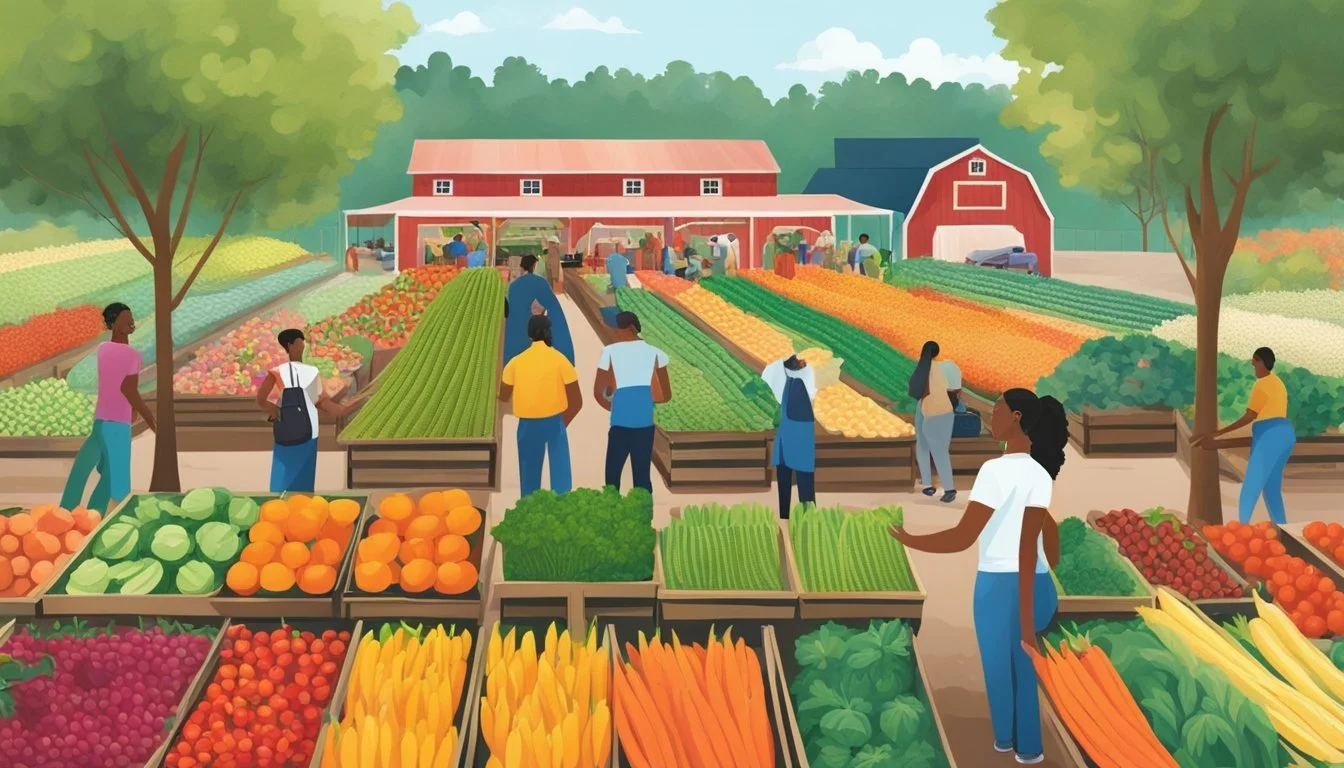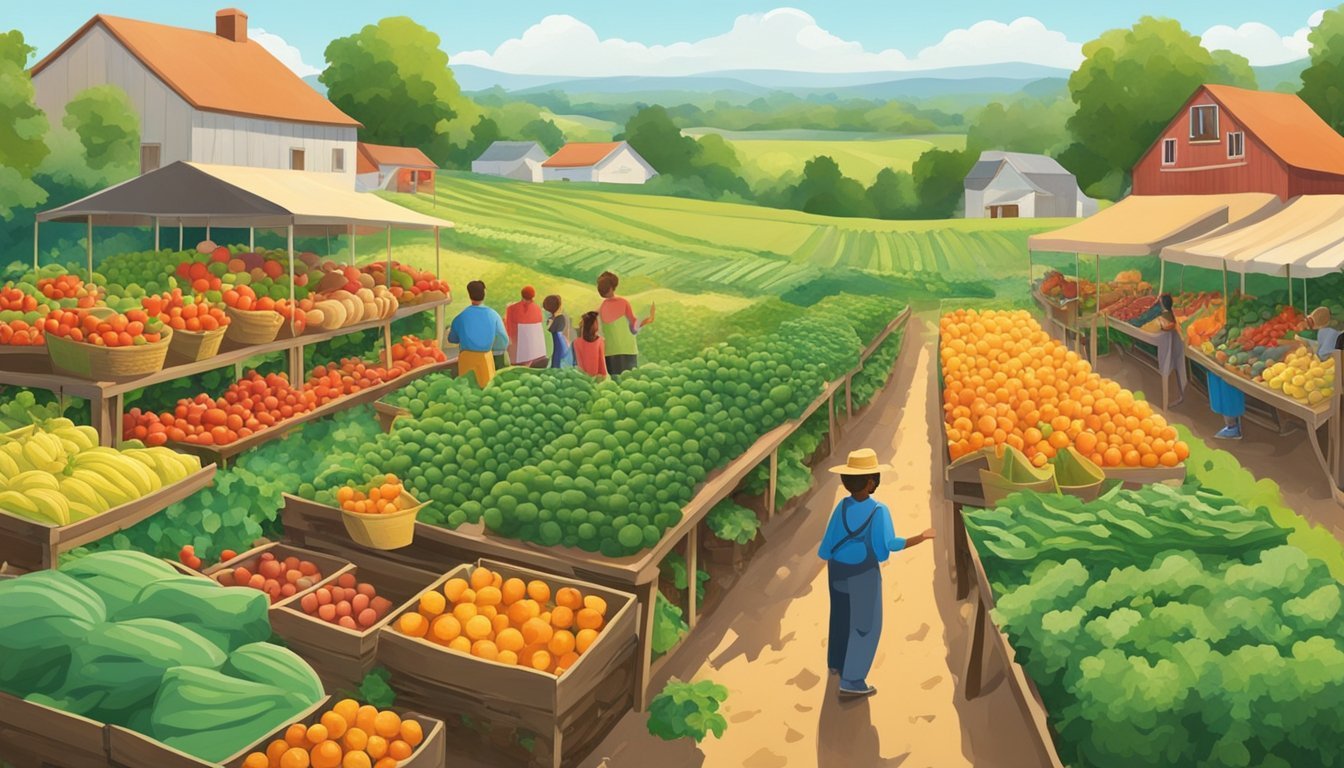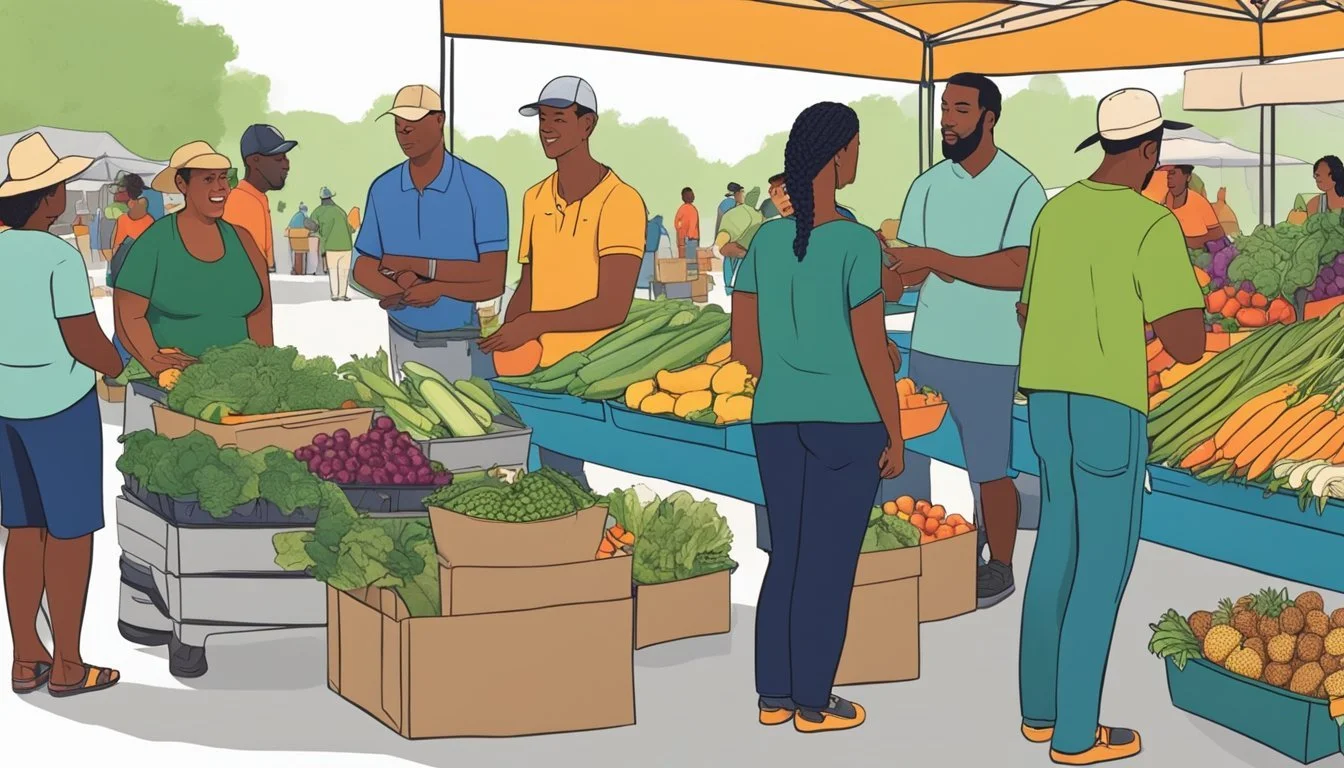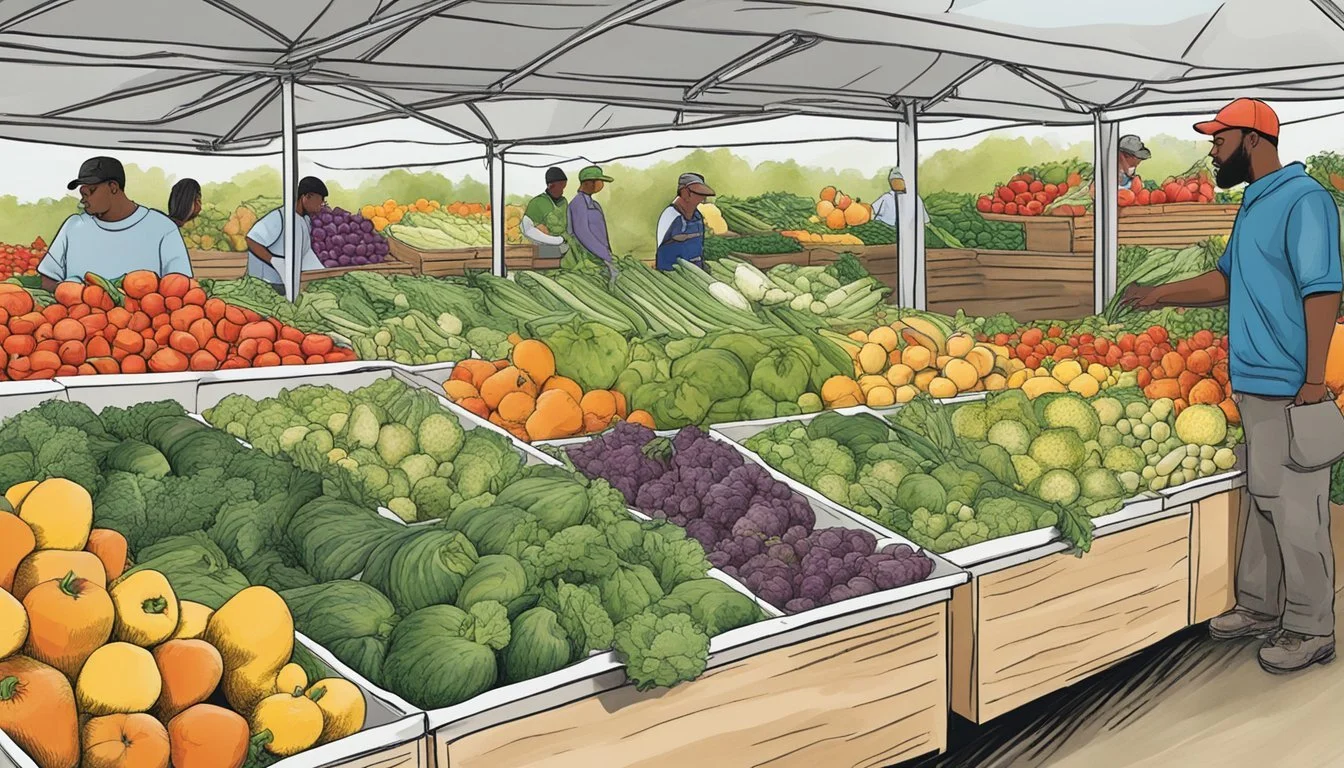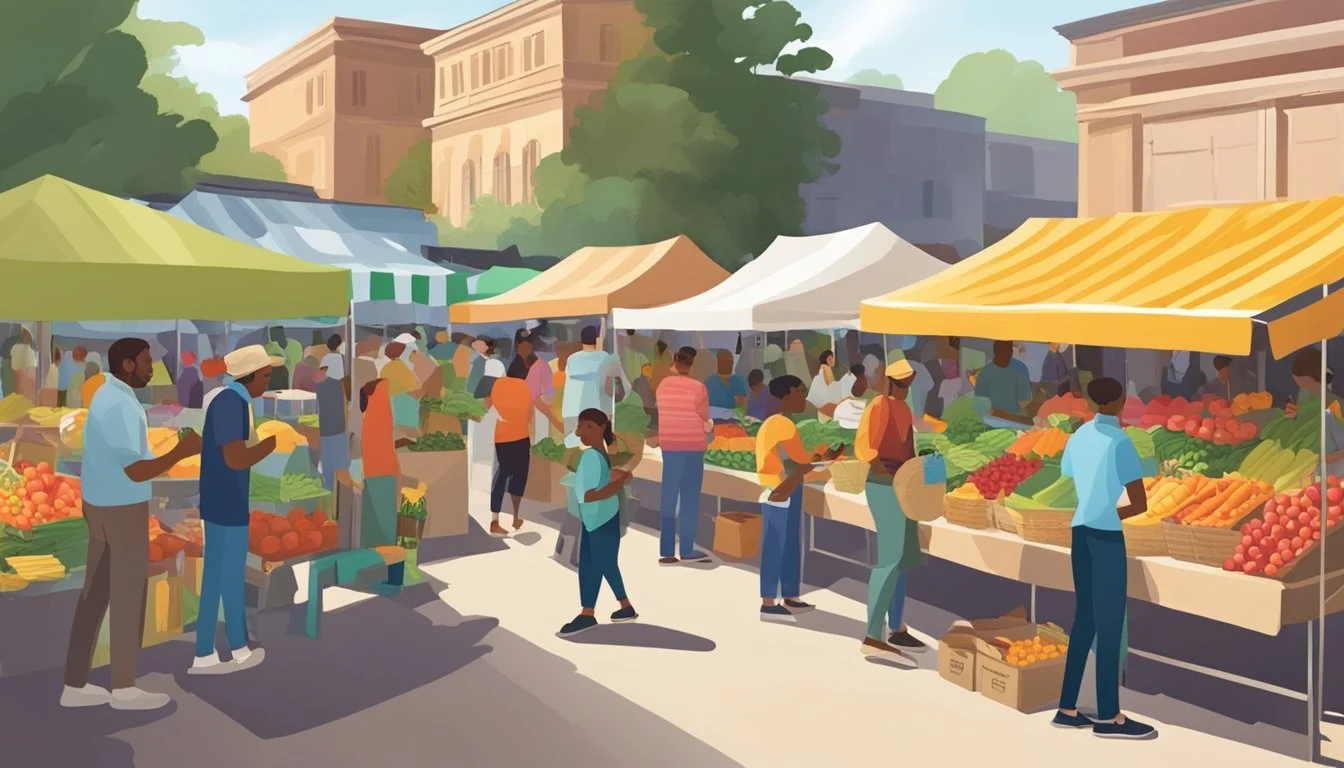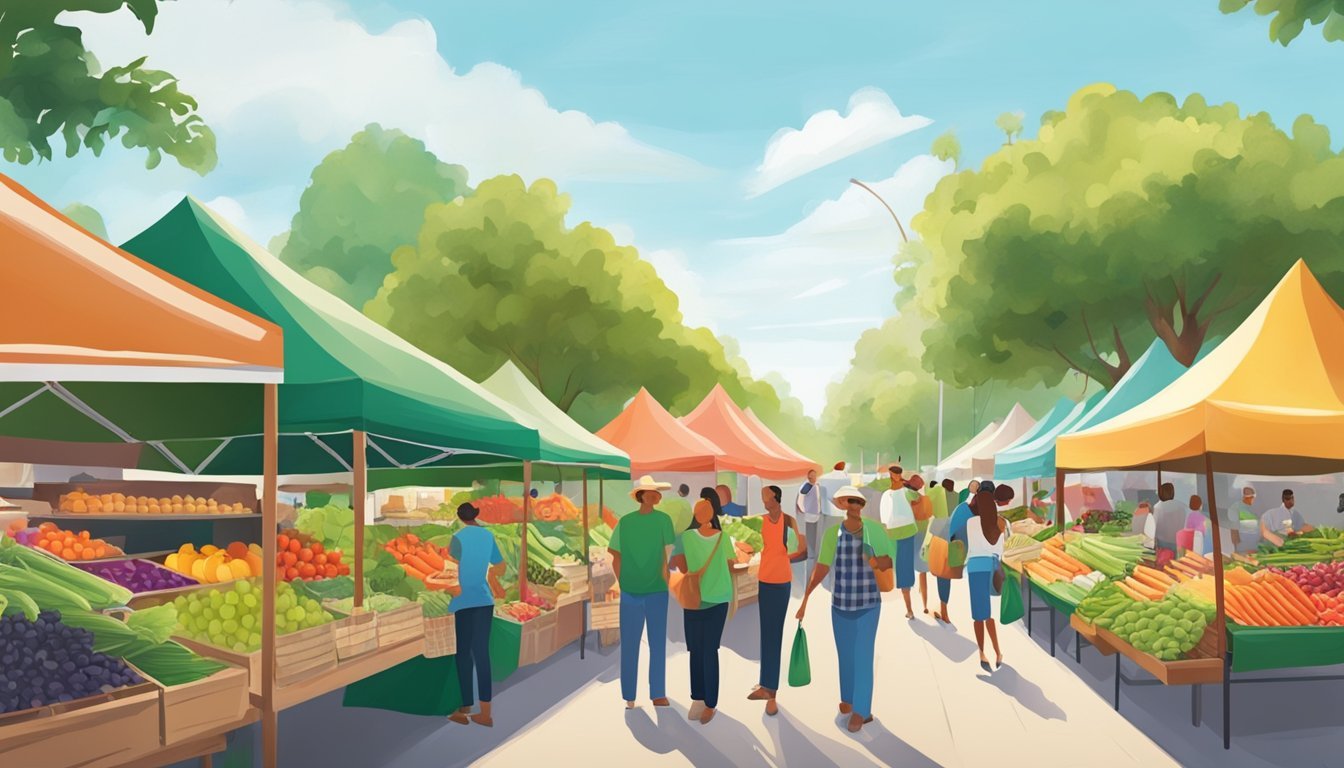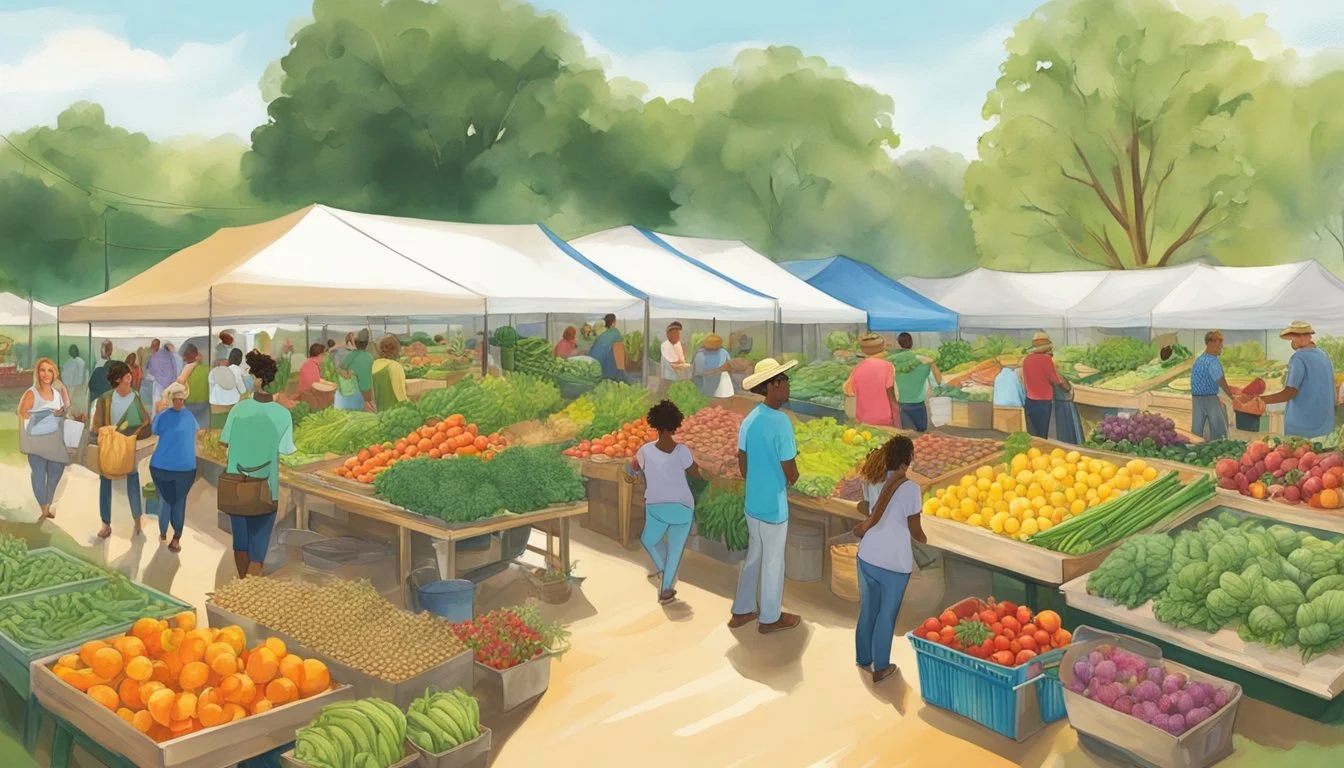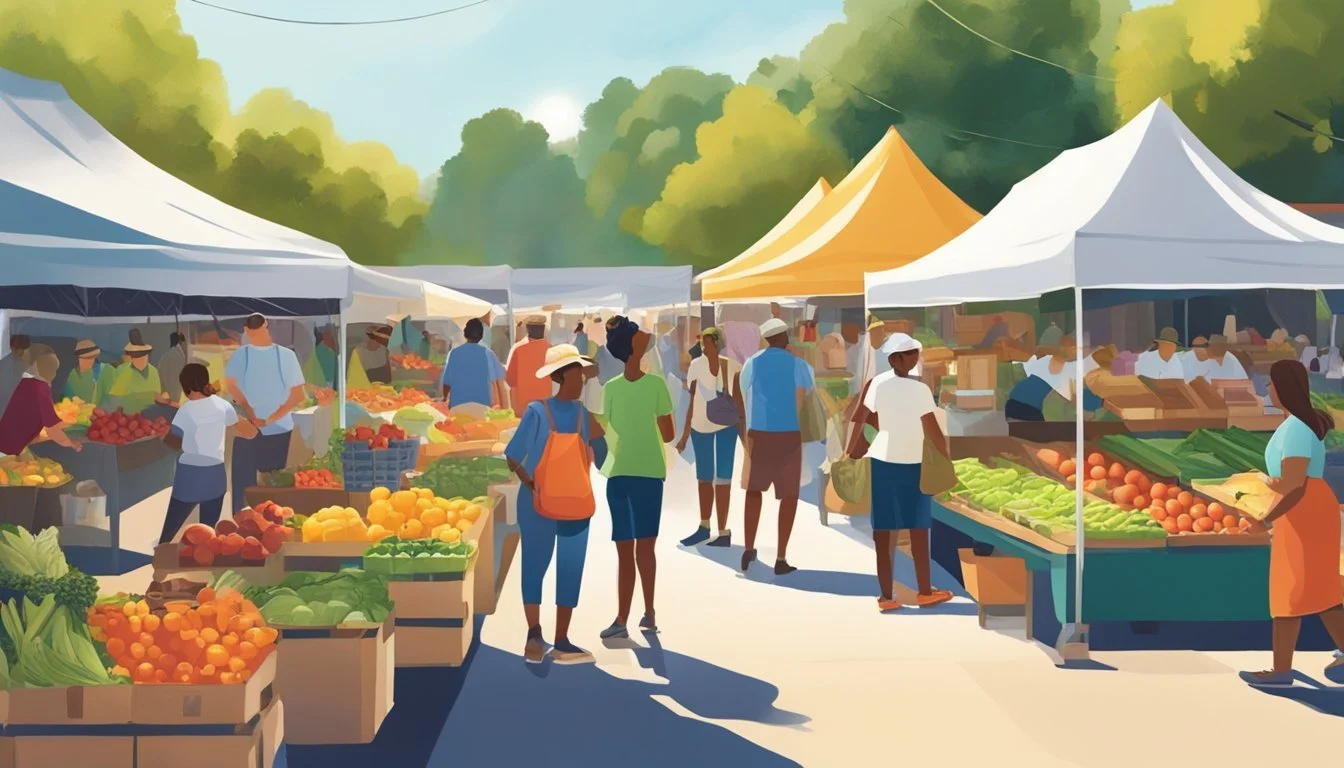Community Supported Agriculture in Tallahassee, FL
A Guide to Local CSAs
Community Supported Agriculture (CSA) represents a model of farming and food distribution that has taken root in places like Tallahassee, FL, where the community directly engages with local farm operations. In essence, CSAs allow consumers to subscribe to the harvest of a certain farm or group of farms, receiving regular shares of produce throughout the agricultural season. This model not only fosters an intimate relationship between farmers and consumers but also supports local agriculture by providing farmers with upfront revenue that helps them plan and sustain their operations.
Tallahassee's unique climate and fertile land make it an ideal location for a variety of CSAs that offer a range of produce, from specialty fruits and nuts to organically grown vegetables. Farmers in the region have embraced this model, encouraged by a community that values fresh, sustainable, and locally-grown food. For example, operations such as the Hiamonee Farms began with chestnut planting in 2001 and later expanded into citrus and bramble fruits.
The growth of CSA in the area extends beyond just the provision of fresh food; it also includes efforts toward sustainable living and responsible development. Initiatives such as Pine Dove Farm illustrate how agricultural communities integrate living spaces with farming, promoting a lifestyle that is both rural and interconnected with the natural environment. This model not only preserves open spaces but also ensures that local produce is a cornerstone of the community’s sustainability efforts.
Understanding CSA
Community Supported Agriculture (CSA) in Tallahassee offers a mutually beneficial relationship between local farmers and consumers, fostering shared support and risk management.
Definition
Community Supported Agriculture (CSA) refers to a model where consumers purchase shares or memberships from local farms and, in return, receive regular distributions of the farm's produce during the harvest season. This concept allows for direct support of farmers, as they receive upfront payment which helps to cover the initial operational costs. The consumers, often referred to as shareholders, are provided with fresh, seasonal produce, thus establishing a relationship rooted in mutual support.
History in North Florida
The practice of CSA has been growing in North Florida, with farms around Tallahassee contributing to its development. Referencing the LocalHarvest database, it can be noted that farms such as Hiamonee Farms began diversifying agriculture in the region with crops like specialty fruits and nuts since 2001. Establishments of citrus groves in 2010 and expansion to bramble fruits in 2016 indicate a gradual increase in CSA variety and options. This progression embodies the region's adaptability and commitment to community-oriented agriculture, highlighting a shift in consumer-farmer dynamics where shared risks — such as crop failures or weather changes — are more collectively managed.
Benefits of Joining a CSA
Joining a Community Supported Agriculture (CSA) program in Tallahassee, FL brings together consumers who prioritize freshness, nutrition, and community engagement. They experience a direct connection to the local food system and foster a sustainable agricultural economy.
Fresh and Seasonal Produce
CSA members relish the benefit of receiving fresh produce that is in harmony with the local growing seasons. The seasonal vegetables and fruit one acquires through a CSA are often harvested at their peak, guaranteeing maximum flavor and freshness. This not only ensures that community members enjoy tastier produce but also contributes to a lesser environmental impact due to reduced transport distances.
Typical Seasonal Produce in Tallahassee, FL CSA:
Spring: Strawberries, lettuce, and peas
Summer: Tomatoes, peppers, and blueberries
Fall: Squash, apples, and collard greens
Winter: Citrus fruits, kale, and root vegetables
Supporting Local Farmers
When community members join a CSA, they pledge their support for local farmers and small businesses. This commitment provides farmers with a more predictable income stream and allows them to focus on sustainable farm practices. The direct-sale model eliminates many of the middlemen, reinforcing the local economy and allowing farmers to retain a greater share of the food dollar.
Impact on Local Farmers:
Increased stability due to member commitments
Greater financial returns from direct sales
Nutritional Value and Health
The produce found in CSA shares are less likely to lose nutritional value compared to those that travel long distances before reaching the consumer. Members typically receive their shares within a short time frame after harvest, which helps preserve the vitamins and minerals found in healthy produce. The variety of vegetables and fruit provided also encourages a nutrient-rich and diverse diet, supporting overall health and well-being.
Nutritional Highlights of CSA Produce:
Higher levels of antioxidants in freshly picked items
Diversity of produce encourages a well-rounded diet
How CSAs Work
Community Supported Agriculture (CSA) programs in Tallahassee function through a membership-based system where consumers receive regular deliveries of locally grown produce. This structure ensures support for local farmers while providing fresh, seasonal food to the community.
Subscription Service Model
In the CSA model, individuals subscribe to receive a periodic box of fresh produce directly from the farm. This subscription is often referred to as a "share". It typically provides the subscriber with a weekly or bi-weekly assortment of the farm's current harvest.
Seasonality and Shares
The contents of each CSA box reflect the seasonal produce available. Farmers curate the content based on what is growing during the season. This means that subscribers receive an array of fruits and vegetables that are at their peak freshness and nutritional value.
Payment Structures
The payment for a CSA subscription can vary. Some operate on a pay-as-you-go basis, whereas others might require upfront payment for the entire season. This upfront payment serves as critical early-season capital for the farmers, helping to cover the initial costs of planting and maintaining the crops.
Option 1: Upfront Seasonal Payment
Option 2: Installment Payments
Option 3: Work-Share Agreements (contribute labor in exchange for produce)
Types of Products Offered
Community Supported Agriculture (CSA) programs in Tallahassee, Florida, offer a robust variety of locally-grown products, meeting the community's demand for fresh and organic options. These programs focus on providing seasonal produce, ensuring that members receive the freshest fruits and vegetables while supporting sustainable farming practices.
Vegetables and Fruits
Tallahassee CSAs are known for their diverse range of vegetables and fruits. Members can expect to receive staple crops such as:
Tomatoes
Peppers
Cucumbers
Squash
Additionally, they might encounter an array of fruits like citrus, such as oranges and grapefruits, which have been successfully cultivated in the region since 2010. In recent years, local farms have diversified their offerings to include specialty items:
Bramble fruits (production expanded in 2016)
Chestnuts
Loquats
Each season brings its unique harvest, aligning with the CSA's commitment to seasonal and organic produce.
Beyond Produce
While fruits and vegetables are the cornerstones of CSAs, Tallahassee farms also extend their offerings to include non-produce items. They may offer:
Herbs (including specialty crops like garlic)
Flowers, contributing to local biodiversity and beautification
Starchy staples such as arrowroot and taro
These items not only enrich the CSA shares but also underscore the farms' dedication to promoting an eco-conscious and varied local food system. Members benefit from an expanded selection, enabling them to experience the full spectrum of agricultural produce beyond the typical fruits and vegetables array.
Choosing a CSA in Tallahassee
In Tallahassee, the CSA model provides a direct bridge between local farmers and consumers, offering fresh, seasonal produce and the opportunity for the community to connect with their food source.
Considerations for Consumers
When selecting a CSA in Tallahassee, consumers should assess their preferences for produce variety and the level of involvement they desire in the farming process. Consumers must ascertain the delivery options available, as some CSAs in Tallahassee provide on-farm pickups while others may offer convenient drop-off locations or home delivery services. They ought to evaluate share sizes to ensure the quantity of produce matches their household's needs. It’s also crucial to recognize each CSA’s commitment to sustainable agriculture practices.
Delivery Options: On-farm pickup, drop-off points, home delivery
Share Size: Single, small family, large family
Agricultural Practices: Organic, biodynamic, conventional
Comparing CSA Options
Tallahassee offers a variety of CSA programs, ranging from farms like Hiamonee Farms, which not only offers traditional vegetables but also specializes in fruits, nuts, and other specialty crops, to initiatives like Pine Dove Farm that integrate the community into a broader Planned Agricultural Community.
Specialty Product CSAs: Some CSAs may provide an array of specialty items including fruits and nuts alongside traditional vegetables.
Agrihoods: Communities like Pine Dove Farm can offer unique experiences that incorporate the concepts of sustainable living with farming.
Before committing to a CSA, consumers should compare what each farm offers in their shares. They ought to check if it's solely vegetables, or if other products like fruits, herbs, and eggs are included. Knowing the seasonality of the produce can also inform the consumer about what to expect throughout the year, which can be crucial in tailoring to a family’s consumptive habits and preferences. Interaction with farmers markets can also provide insights into the fresh produce and added products that may be available with each CSA.
Consumers seeking CSAs in Tallahassee benefit from engaging with and supporting local agriculture, gaining access to fresh, local food straight from their producers. This model fosters a sense of community while promoting sustainable food systems within Florida.
The Role of Farmers Markets
In Tallahassee, FL, farmers markets serve as pivotal hubs for the distribution of local produce, forging a crucial link between Community Supported Agriculture (CSA) programs and consumers who are seeking fresh, local food options.
CSAs and Farmers Markets Connection
Agricultural producers in the region benefit from farmers markets as they often serve as the pick-up locations for CSA shares. This arrangement supports local farmers by ensuring a consistent and dedicated consumer base, while also offering the community access to a plethora of farm-fresh goods. The interdependence of CSAs and farmers markets fosters a collaborative environment where local farmers can interact with and educate consumers about their offerings and sustainable farming practices.
Farmers market benefits for CSAs:
Provides a centralized distribution point for CSA shares.
Enables direct farmer-consumer interaction.
Strengthens local food systems and economies.
Visit and Explore Options
Individuals are encouraged to visit their local Tallahassee farmers market to explore the variety of products offered by different CSAs and local farmers. These markets are more than just places to shop; they are experiences that allow visitors to understand where their food comes from and the effort that goes into its production. Each visit presents the opportunity to engage with local farmers, gain knowledge about seasonal produce, and contribute to the community's sustainable food network.
Why visit Tallahassee farmers markets:
Discover fresh, seasonal produce directly from local sources.
Support the local economy and farming community.
Learn about sustainable agriculture and food practices.
Community Impact
Community Supported Agriculture (CSA) in Tallahassee, FL, contributes significantly to the local area by bolstering the economy, enhancing environmental sustainability, and fostering community engagement through various initiatives.
Economic Benefits
Community Supported Agriculture has been instrumental in stabilizing the finances of local farms in Tallahassee. By providing up-front financial resources, these programs ensure that farmers have the capital required to adequately plan and execute their production cycles. In return, the community benefits from access to fresh, local produce. CSA initiatives like Hiamonee Farms not only diversify the local agricultural outputs with specialty fruits and nuts but also circulate money within the local economy, promoting job creation and entrepreneurial opportunities for residents.
Environmental Sustainability
Farms involved in CSA programs often embrace sustainable practices that have a lasting positive effect on the environment. Practices such as controlled usage of inputs and adoption of organic farming methods lead to healthier soil, lower carbon emissions, and less water pollution. Farms like Pine Dove Farm in the Tallahassee area promote responsible development, aiming to reduce their environmental footprint while offering fresh produce to their patrons. By maintaining a balance between agricultural production and natural resource conservation, CSAs contribute meaningfully to the overall sustainability of the community.
Community Building
CSAs inherently promote a sense of unity by connecting people through food and agriculture. Programs such as Seed Time Harvest Farms in Monticello demonstrate this by combining the efforts of many local farmers to address community needs, thus fostering a sense of togetherness and mutual support. Members often engage in special workdays and help with distribution, which strengthens the bond between consumers and growers. This collaborative approach not only supplements the local food supply but also solidifies the community fabric by encouraging direct interaction and cooperation.
Challenges Faced by CSAs
Community Supported Agriculture (CSA) programs in Tallahassee, FL, experience a range of challenges, from the volatility of weather patterns to maintaining robust customer relationships.
Weather Dependent Risks
CSAs heavily depend on stable weather conditions. In Tallahassee, unpredictable weather, including hurricanes, droughts, or excessive rainfall, can directly affect crop yields. This vulnerability to weather can lead to significant challenges:
Crops Lost to Extreme Weather: Potential crop failure due to adverse weather events can result in financial setbacks for farms operation.
Risk Mitigation Strategies: While some farms may adopt diverse planting schedules and crop varieties to mitigate risks, the unpredictability remains a substantial hurdle.
Marketing and Customer Retention
Developing effective marketing strategies and retaining a loyal customer base are critical for the sustainability of CSAs:
Attracting New Customers:
Targeted Outreach: Creation and implementation of marketing campaigns that resonate with local community values.
Events and Education: Hosting farm tours and educational events to engage potential clients.
Maintaining Existing Relationships:
Community Engagement: Keeping subscribers involved through regular CSA updates, including newsletters and social media.
Feedback Loops: Encouraging and acting on customer feedback to improve farm operation and product offerings.
Strategic marketing and strong customer relationships are essential to counter the inherent challenges of CSA models.
Future of CSA in Tallahassee
In Tallahassee, the Community Supported Agriculture model shows significant potential for growth. Innovations in farming practices are expected to play a crucial role in the evolution of local CSAs.
Growth and Trends
The trend in North Florida, particularly in Tallahassee, is leaning towards an increase in CSA participation. This growth is influenced by a keen community interest in sustainable and locally-sourced food. Pine Dove Farm, the area's first Planned Agricultural Community (PAC), exemplifies the trend by merging sophisticated rural living with the benefits of CSA. LocalHarvest lists CSAs in the area which indicates an existing infrastructure that can support an expanding CSA market.
Current CSAs: Local presence (e.g., Seed Time Harvest Farms)
Driving Factors: Community interest, sustainable living trends
Projected Growth: Increasing CSA memberships and farm participation
Innovation in Farming Practices
CSAs in Tallahassee are expected to adopt increasingly innovative farming practices to extend their growing seasons and improve yield. For example, the use of season-extension techniques has allowed New England CSAs to operate for six to seven months, and a similar approach can be taken in North Florida to maximize productivity. Furthermore, CSAs such as Hiamonee Farms have expanded their production to include specialty crops, indicating a move towards diversification of produce.
Season-extension: Adoption of techniques for longer growing periods
Specialty Crops: Expansion into crops like citrus, brambles, garlic
Technological Integration: Potential use of precision agriculture tools
Additional Resources
In Tallahassee, those interested in community-supported agriculture have access to a range of resources that provide learning opportunities and directories for local CSA programs.
Learning and Involvement
Community members seeking education about CSA or ways to become involved can benefit from the programs offered by the Florida Department of Agriculture & Consumer Services. This state department is a repository of information for individuals looking to understand the intricacies of agricultural practices and consumer services related to local produce.
Additionally, Workshops and Events aimed at enhancing public knowledge and participation in local agricultural endeavors are often held in various locations around Tallahassee, including farm stands and mobile markets.
Local CSA Directories
For those interested in joining a CSA, Tallahassee boasts a unique set of options. LocalHarvest's website serves as a valuable tool in finding nearby CSA programs. Here's a list of some local CSA farms:
Hiamonee Farms: Specializes in citrus, brambles, chestnuts, and an assortment of other specialty crops.
Pine Dove Farm: Known as North Florida's first Planned Agricultural Community, offering residents a mix of rural living and city access.
The University of Florida also contributes to the community-supported agriculture scene, providing insights into how CSAs operate and how community members can engage with them, including the possibility of "working shares" to reduce payment through hands-on help.

